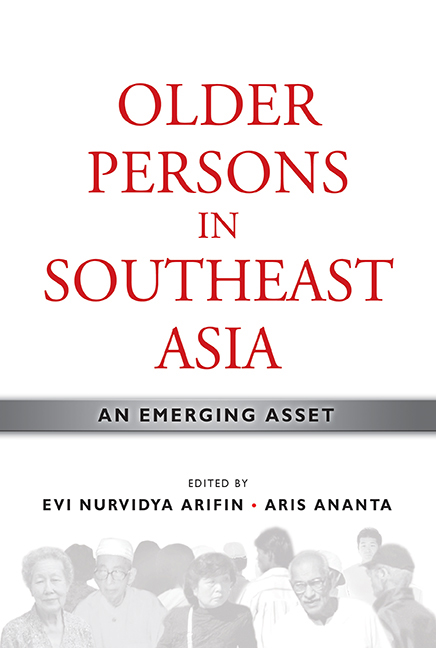Book contents
- Frontmatter
- Contents
- List of Tables
- List of Figures
- Foreword by Hal Hill
- Message from the Director
- Preface
- Contributors
- PART I INTRODUCTION
- PART II OLD-AGE INCOME SECURITY
- 3 Economics and Old Age: The Singapore Experience
- 4 National Long-Term-Care Severe Disability Insurance in Singapore
- 5 Social Security and Health Care Financing for Older Persons in Thailand: New Challenges
- 6 An Exploration of a Universal Non-contributory Pension Scheme in Vietnam
- PART III EMPLOYMENT AND OTHER SOURCES OF FINANCIAL CONTRIBUTION
- PART IV AGEING, MIGRATION, AND DEVELOPMENT
- PART V ROLES OF GOVERNMENT AND CIVIL SOCIETY
- Index
6 - An Exploration of a Universal Non-contributory Pension Scheme in Vietnam
from PART II - OLD-AGE INCOME SECURITY
Published online by Cambridge University Press: 21 October 2015
- Frontmatter
- Contents
- List of Tables
- List of Figures
- Foreword by Hal Hill
- Message from the Director
- Preface
- Contributors
- PART I INTRODUCTION
- PART II OLD-AGE INCOME SECURITY
- 3 Economics and Old Age: The Singapore Experience
- 4 National Long-Term-Care Severe Disability Insurance in Singapore
- 5 Social Security and Health Care Financing for Older Persons in Thailand: New Challenges
- 6 An Exploration of a Universal Non-contributory Pension Scheme in Vietnam
- PART III EMPLOYMENT AND OTHER SOURCES OF FINANCIAL CONTRIBUTION
- PART IV AGEING, MIGRATION, AND DEVELOPMENT
- PART V ROLES OF GOVERNMENT AND CIVIL SOCIETY
- Index
Summary
Rapid declines in fertility rates and mortality rates along with substantial improvements in health care systems have resulted in the growth of the number of older persons around the world, and this trend is expected to continue in the coming years. With the definition of an older person as one aged 60 years and above, the medium-variant population projections of the United Nations show that the number of older persons will increase from 672 million in 2005 (or 10.3 per cent of the world population) to about two billion people in 2050 (or 21.8 per cent of the world population) (United Nations 2007a). Particularly in the developing countries that grow old before becoming rich, population ageing will present various challenges for public policies in the coming decades. In addition, under profound social and economic changes stemming from modernization and urbanization, the weakening of family bonds also suggests an urgent task of providing for old age security in developing countries, where social security systems are underdeveloped with extremely limited coverage (Schwarz 2003).
As one of the fastest growing economies in the world, Vietnam is also experiencing the changes just described. The aforementioned population projections indicate that the number of older persons in Vietnam will increase significantly from 7.6 per cent of the whole population in 2005 to 26.1 per cent in 2050. Moreover, a swift economic transformation since the Doi Moi (renovation) programmes in 1986 has had significant impact on all areas of society, resulting in substantial improvements in living standards for many people, including older persons. However, while such remarkable successes have been widely acknowledged, many groups of older persons are still living in poor and vulnerable conditions. The majority of them are living in rural, isolated, and disadvantaged areas (Le et al. 2005). Only a small percentage of older persons in Vietnam are receiving public pensions, while others are living on their own and/or supported by family members (Ministry of Labour, War Invalids, and Social Affairs, Vietnam 2005). In addition, a potentially worrisome issue for supporting older persons is that the past decade has witnessed a continuous decline in the number of those living as dependents, and a continuous increase in the number of those living alone, or in households with only other older persons (Giang and Pfau 2007a).
- Type
- Chapter
- Information
- Older Persons in Southeast AsiaAn Emerging Asset, pp. 140 - 164Publisher: ISEAS–Yusof Ishak InstitutePrint publication year: 2009



